

Untitled. The Harper Index - Framing. What is framing?

Framing is the practice of influencing how people think and feel about issues by encouraging them to think about them in a particular way. This is done with language that conjures up and appeals to images and values that people know and understand deeply. The political Right is masterful at framing issues in ways that glorify business and individual achievement and disparage public enterprise. Consider the words "tax relief" with "tax fairness", "bureaucrat" with "public servant", "troop surge" with "escalation", "conflict" with "occupation". Each pairing presents an issue seen from the right-wing frame and from the . Linguist and cognitive scientist has been credited with helping American Democrats successfully challenge the Bush Republicans. He writes: Golden Lake Institute Rockridge Institute.
Social psychological conditioning. Techniques > Conversion > Social psychological conditioning Depluralization | Self-deindividuation | Other-deindividuation | Dehumanization | Demonization | See also Anthony Stahelski (1974) identified five stages of social psychological conditioning used by terrorists that have very close similarity with techniques used by cults.
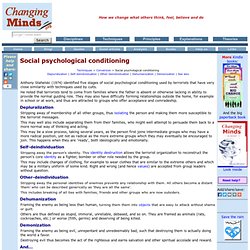
He noted that terrorists tend to come from families where the father is absent or otherwise lacking in ability to provide the normal guiding role. They may also have difficulty forming relationships outside the home, for example in school or at work, and thus are attracted to groups who offer acceptance and comradeship. Depluralization Stripping away of membership of all other groups, thus isolating the person and making them more susceptible to the terrorist messages. This may well also include separating them from their families, who might well attempt to persuade them back to a more normal way of thinking and acting. Self-deindividuation Other-deindividuation. Identity destruction. Techniques > Conversion > Identity destruction Becoming lost | Breaking with the past | Identity reconstruction | See also The process of converting a person to have different beliefs and behaviors is effectively changing who they are.
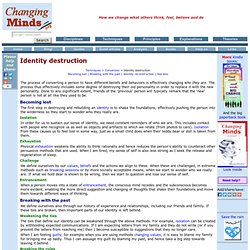
The process thus effectively includes some degree of destroying their old personality in order to replace it with the new personality. Done to any significant extent, friends of the 'previous' person will typically remark that the 'new' person is not at all like they used to be. Becoming lost The first step in destroying and rebuilding an identity is to shake the foundations, effectively pushing the person into the wilderness so they start to wonder who they really are. Isolation In order for us to sustain our sense of identity, we need constant reminders of who we are.
Exhaustion. Learn about the field of Media Psychology at AllPsychologyCareers.com. Learn about Media Psychology fields and careers in this growing industry...

Some believe that the constant replaying of the World Trade Center collapse on television after the terrorist attacks of September 11, 2001 caused stress (see Stress) and anxiety (see Anxiety) for viewers across the country. Many people blamed the media’s graphic images for propagating widespread fear and depression beyond that attributed to news of the incident itself. Never before had a national disaster of this magnitude occurred on American soil, and technology's immediacy made the event a second-by-second spectator event. For those in media psychology, this tragic event generated research studies that continue to raise as many questions as answers.
Professionals working in the field of Media Psychology use psychological theories, concepts and methods to study the impact of the mass media on individuals, groups and cultures. You Are Not So Smart. Psychology Fields & Topics - Learn more about popular psychology topics and fields. Psychotherapy by Münsterberg, Hugo. Social change through media technologies. The Psychology of Storytelling. Transmedia storytelling is one of the most exciting developments to hit entertainment, branding, marketing, and advocacy in the last few years.
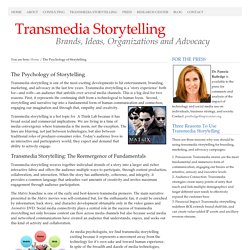
Transmedia storytelling is a ‘story experience’ both for—and with—an audience that unfolds over several media channels. This is a big deal for two reasons. First, it represents the continuing shift from a technological to human focus. Second, storytelling and narrative tap into a fundamental form of human communication and connection, engaging our imagination and through that, empathy and creativity. Transmedia storytelling is a hot topic for A Think Lab because it has broad social and commercial implications. Transmedia Storytelling: The Reemergence of Fundamentals Transmedia storytelling weaves together individual strands of a story into a larger and richer interactive fabric and offers the audience multiple ways to participate, through content production, collaboration, and interaction.
Control. Explanations > Needs > Sense of Control Control is a deep, deep need | The control trap | So what?
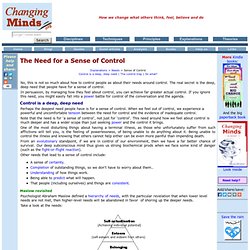
No, this is not so much about how to control people as about their needs around control. The real secret is the deep, deep need that people have for a sense of control. In persuasion, by managing how they feel about control, you can achieve far greater actual control. If you ignore this need, you might easily fall into a power battle for control of the conversation and the agenda. Control is a deep, deep need Perhaps the deepest need people have is for a sense of control. Note that the need is for 'a sense of control', not just for 'control'. One of the most disturbing things about having a terminal illness, as those who unfortunately suffer from such afflictions will tell you, is the feeling of powerlessness, of being unable to do anything about it. From an evolutionary standpoint, if we are in control of our environment, then we have a far better chance of survival.
Control-Identity types. Explanations > Preferences > Control-Identity types Leader | Follower | Independent | Drifter | Balanced | So what?
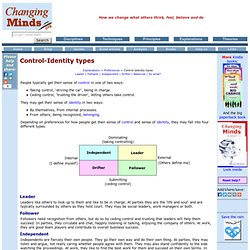
People typically get their sense of control in one of two ways: Taking control, 'driving the car', being in charge. Ceding control, 'trusting the driver', letting others take control.